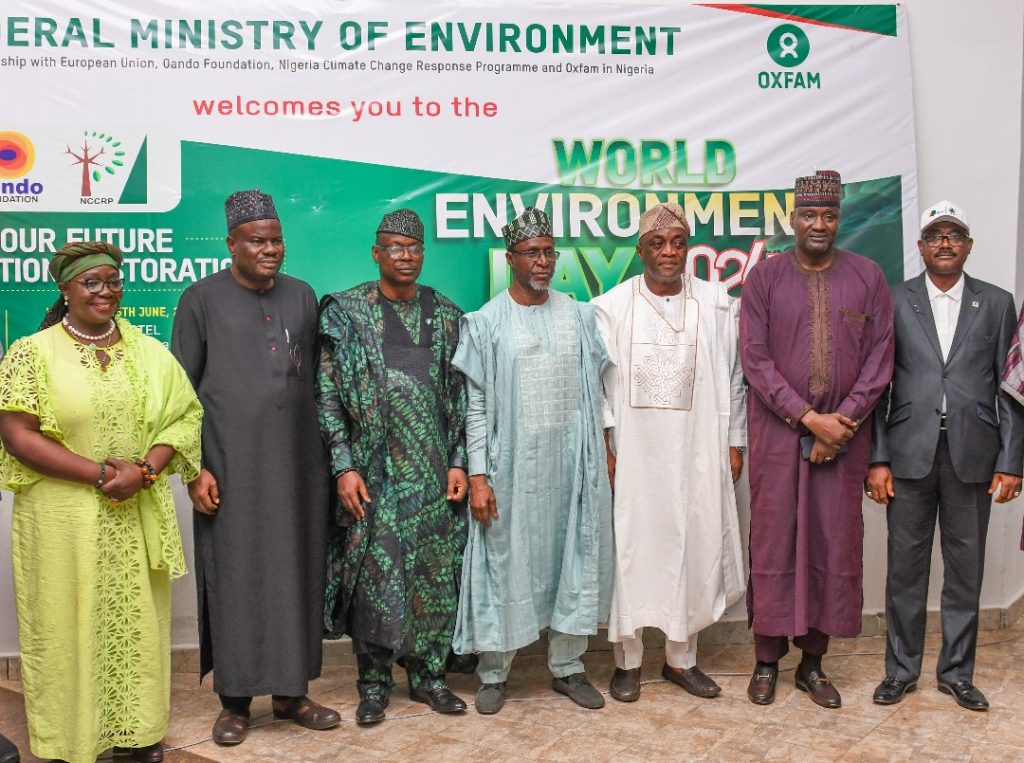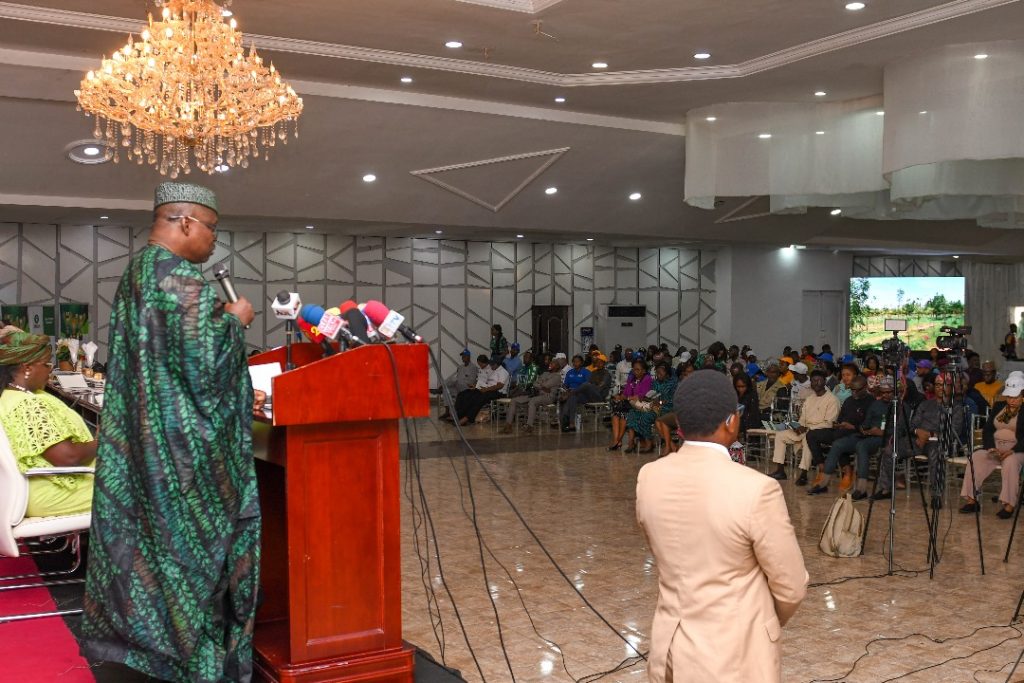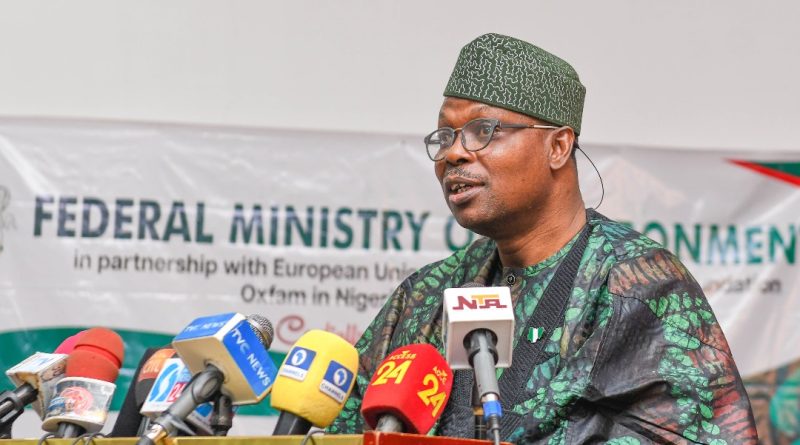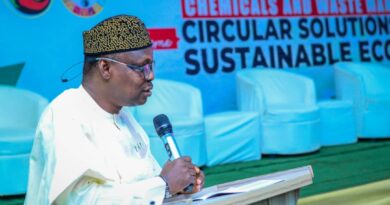Minister Enumerates Tinubu’s Accomplishments At The 2024 World Environment Day
The United Nation (UN) General Assembly during the Stockholm Conference on the Human Environment in 1972 designated June 5, as the World Environment Day. Nigeria joined the rest of the World to mark this day as the world continues to grabble with massive socio-environmental challenges emanating from the climate change crisis as stakeholders discussed the efforts of the administration of President Bola Ahmed Tinubu in ameliorating the effects of the crisis. Speaking at the event which was held at Palms Hotel in Abuja, The Minister of State for Environment, Dr. Iziaq Adekunle Salako said the government of Tinubu favours nature-based solution (NBS) in addressing these challenges in a way that protects the wellbeing of all creatures on planet earth and conserves our biodiversity. He said even though these solutions are not new but are gaining prominence because they better appreciate the importance of living in harmony with nature. NBS are interventions that use nature and the natural functions of healthy ecosystems to tackle some of the most pressing challenges of our time. They address key societal challenges through the protection, sustainable management and restoration of both natural and modified ecosystems, benefiting biodiversity and wellbeing. NBS is a vital tool for tackling climate change, nature and biodiversity loss, pollution and waste. It is a cost-effective pathway to our drive for generations restoration.
He said ” A key driver of the NBS concept is The Kunming-Montreal Global Biodiversity Framework (KMGBF), adopted at Montreal, Canada in 2022 by 196 countries during the 15th Conference of Parties to the United Nations Convention on Biological Diversity. It is an ambitious, multifaceted plan to halt and reverse the rapid biodiversity loss that our planet is experiencing. The framework came against the background of dangerous “decline in nature threatening the survival of 1 million species and impacting the lives of billions of people worldwide”. It set out global targets to be achieved by 2030 and beyond to safeguard the sustainability of world’s biodiversity.
“Regarded as the “agreement for nature” and the most significant agreement to date under the CBD, the KMGBF consists of 4 goals and 23 targets including goal number 4 focusing on adequate means of implementation in terms of financing, capacity building, transfer of technology and scientific cooperation. Specifically, the framework included a plan for wealthy countries to deliver at least 20 billion USD annually in international biodiversity finance to developing countries by 2025 and 30 billion USD by 2030. This underscores the critical role of building a united synergy between countries best positioned to deliver biodiversity finance and have benefited economically the most from practices that have negatively impacted the state of global biodiversity with countries home to most of the planet’s biodiversity.”

The Global South represents 85% of world’s population and is home to most of the globe’s biodiversity that provides essential ecosystems services benefiting every area on earth. Of the top 50 most biodiverse countries in the world according to Mongabay, a US based non-profit conservation and environmental science platform, 46 of them are from the global South. Conversely, the Global North that represents 15% of world’s population have benefitted economically the most from practices negatively impacting global diversity thus controlling 61% of global GDP. In summary, the Global North has the resources, the Global South has the biodiversity, and the world needs them both if we are to mitigate the worst consequences of climate change and a century of our ravenous consumption of the planet’s resources.
The Global South is home to most of the world’s biodiversity, and Africa is immensely rich in biodiversity, with its living organisms accounting for around a quarter of total global biodiversity. This biodiversity underpins Africa’s economy and livelihoods, and it provides ecosystem services that the entire global community depends on for climate stability, clean water, and rainfall for crops. Marine biodiversity is the main source of protein for over a billion people worldwide with more than three billion people depend on ocean and coastal biodiversity for their livelihoods, most of them in developing countries.
Salako noted that the benefit of investing in nature are immense and not easily matched by any technological dependent solutions.
He said “the World Economic Forum has found that a nature-positive economy could generate up to 10.1 trillion USD in business value every year and create 395 million jobs by 2030. All told, about 55% of global GDP or about 58 trillion USD is moderately or highly dependent on high-functioning biodiversity and ecosystem services. As of 2022, the International Labour Organization estimated that 20 million new jobs could be created by harnessing the power of nature to address challenges such as climate change, disaster risk, food and water insecurity.
“Nigeria the most populous country in Africa and the 5th in the Global South boasts of some of the richest flora land faunal biodiversity in Africa. The diversity of Nigeria’s natural ecosystem ranges from semi-arid savanna to mountain forest, rich seasonal floodplain environments, rainforest, vast freshwater, swamp forests and diverse coastal vegetation Her extensive mangrove forest considered the most ecologically sensitive region in the world covering 10,500 square km is the largest in Africa and third largest in the world (Olaniyi, 2023).. Nigeria is also known as a global hotspot for primate species with most endangered gorilla subspecies on earth, Gorilla gorilla die hill found only in a couple of protected areas in the county. The benefit of Nigeria’s biodiversity is estimated to be over 8 billion USD per annum. Nigeria’s biodiversity is a global public good that has value for the entire world. Thus, we should be frontal in leading to galvanize world attention to nature-based solutions and nature financing.
“Nigeria’s resources and placement in the world offers a good platform for leading a global crusade for more attention for the deployment of natural processes to tackle socio-environmental challenges of climate change in a sustainable manner. Against this background, at the 28th Conference of Parties to the United Nation Framework Convention on Climate Change (COP28) held in Dubai last December, Nigeria alongside other countries took the lead and launched the Ministerial Alliance for Ambition on Nature Finance (MAANF) to give global south countries a united voice in promoting ambition on nature finance focusing particularly on delivering the 20 billion USD in biodiversity financing annually to developing countries in Global South by 2025.”

He said MAANF being chaired by Nigeria through the office of Minister of State for Environment is growing steadily in membership with current membership of 10 countries. He added that the alliance is also stepping up its visibility through strategic programming and networking.
In February, during the 6th United Nations Environmental Assembly, MAANF held a high-level side event to bring focus to the alliance while in April, during the recently held G7 summit in Italy, a communication was made for the G7 countries to reiterate their commitments to deliver 20 billion USD per year to developing countries by 2025 as provided in target 19.a of the Global Biodiversity Framework. The G7 went on to include a reference to this important commitment in their final communique.
The Minister said prioritizing nature-based solutions was important to them in the Federal Ministry of Environment not only because it aligns with the campaign promises of President Bola Ahmed Tinubu GCFR as contained in the Renewed Hope Agenda document, but also because it is an area of comparative advantage for us as a nation that is less technology dependent and resonates more with the livelihood engagements of most Nigerians. He said the campaign promises of the Tinubu-Shettima presidency focusing on the environmental sector are significantly captured by the 18 deliverables cutting across 6 of the 8 presidential priorities given to the ministry of environment to implement.
“Alongside 117 others within the High Ambition Coalition for Nature, Nigeria was a vocal advocate for including 30×30 in the K-M GBF agreement. Under President Bola Ahmed Tinubu, Nigeria’s leadership efforts to drive global attention towards biodiversity financing and nature-based solutions is being matched by domestic prioritization. In the West African sub-region, through the instrumentality of ECOWAS Chairmanship, we are playing a frontline role with the attendant result of regional approach to signing, ratifying and implementing the Biodiversity Beyond National Jurisdiction (BBNJ) Treaty.
“Nigeria in May this year sign the BBNJ treaty becoming the 90th country in the world to do so. We are also working towards its ratification so that at least 30% of the global ocean is highly and fully protected by 2030. We working to fully put on stream the 10 newly designated protected forest areas and working to expand our marine protected areas. We are maintaining our 11 RAMSTAR sites and in the process of designating additional 6 sites as wetlands of international importance. The Special Presidential Initiative for Climate Change Adaptation and Mitigation in the 2024 budget being implemented by the Federal Ministry of Environment contains significant nature-based initiatives. This is in addition to other afforestation, reforestation and land restoration and reclamation initiatives like the great green wall, mangrove restoration and so on being implemented by the ministry.
“The recently signed bilateral cooperation framework agreement on transboundary ecosystem conservation and sustainable management of forestry and wildlife resources with the government of Cameroon is a milestone that will help in the preservation of our biodiversity while the ongoing debate in the national assembly on a bill titled the endangered species conservation and protection bill when passed into law will give more bite to our efforts protect and enrich our biodiversity.
“Our biodiversity offers tremendous economic benefits that far outweighs whatever cost of conservation. Managed and packaged well, it is a source of verifiable, quantifiable and tradeable financial instruments. Unlike carbon credits schemes in nature which are often mono-cultural tree planting so that emitters can compensate for their hard to abate emission on an annual basis, bio-credits focuses on stopping and reversing species loss by addressing a multitude of threats including permanent habitat loss in collaboration with local biodiversity custodians”, Salako said.

He said Bio-credits are less susceptible to “green grabs” where land used by community people for farming and other livelihood, social and cultural activities is taken to plant large tract of forest fit for international carbon market. He added that it is about nature and is intimately linked to the people, the communities, their land tenure and titles, an evolving area that Nigeria must not be a late starter in harnessing. Though a few funded projects in our national parks are targeted at biodiversity preservation and restoration, he said a lot more needs to be done to increase nature positive financial flows from government, development partners and private for-profit organizations. He added that Nigeria is prioritizing nature financing above technology intensive solutions like carbon capture and utilization and solar radiation modification.
Salako called on the nations of the Global North to shake off the current apathy around their commitment to deliver at least 20 billion USD annually in international biodiversity finance to developing countries by 2025 and 30 billion USD by 2030. He also advocated for more investments on nature in Nigeria and the global south countries, who today ate the stewards of global biodiversity.
“When we invest in nature, we protect our ecosystems, safeguard our people, provide good jobs, ensures food security, invites further investment, stabilizes our economy, shelters ourselves from climate change, and preserves our indigenous ways of life. Investing in nature is investing in our future and will yield dividends in multiple folds”, the Minister concluded.




